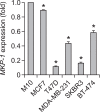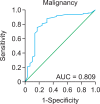The mitogen-activated protein kinase phosphatase-1 (MKP-1) gene is a potential methylation biomarker for malignancy of breast cancer
- PMID: 22333693
- PMCID: PMC3366329
- DOI: 10.3858/emm.2012.44.5.040
The mitogen-activated protein kinase phosphatase-1 (MKP-1) gene is a potential methylation biomarker for malignancy of breast cancer
Abstract
The mitogen-activated protein kinase (MAPK) phosphatase- 1 (MKP-1) belongs to the MAPK cascades which are central to cell proliferation and apoptosis. The carcinogenic role of MKP-1 has been reported in many types of cancer but it has rarely been investigated in breast cancer. The present study was designed to evaluate the MKP-1 mRNA expression and its possible regulation by methylation of MKP-1 promoter in the model of several breast cancer cell lines and tissues as well as controls. Our data demonstrate MKP-1 mRNA expression significantly decreased in five breast cancer cell lines compared to breast controls (P<0.01). Using the methylation-specific PCR (MSP) analysis, the unmethylated reaction (U) is dominant in both normal cell lines and benign breast tumors (100% vs. 86.2%), whereas the methylated reaction (M) is dominant in both breast cancer cell lines and invasive breast tumors (100% vs. 57.2%). In terms of methylation ratio (M/M+U), methylation level in MKP-1 promoter is significantly higher in the invasive breast tumor tissues (n = 152) than in benign breast tumor tissues (n = 29) (P<0.0001). Assessing the methylation ratio of the promoter of MKP-1 gene to diagnose the breast malignancy (invasive vs. benign), the area under the receiver- operating characteristic (ROC) curve was 0.809 (95% CI: 0.711-0.906, P<0.001). The best performance for this prediction has a sensitivity of 76.32% and a specificity of 82.76% at the cutoff value of 0.38. Taken together, we firstly demonstrated that the promoter methylation of MKP-1 gene is a potential breast cancer biomarker for breast malignancy.
Figures



Similar articles
-
Mitogen-activated protein kinase phosphatase-1 in human breast cancer independently predicts prognosis and is repressed by doxorubicin.Clin Cancer Res. 2009 May 15;15(10):3530-9. doi: 10.1158/1078-0432.CCR-08-2070. Epub 2009 May 5. Clin Cancer Res. 2009. PMID: 19417026
-
c-Jun N-Terminal Kinase Inactivation by Mitogen-Activated Protein Kinase Phosphatase 1 Determines Resistance to Taxanes and Anthracyclines in Breast Cancer.Mol Cancer Ther. 2016 Nov;15(11):2780-2790. doi: 10.1158/1535-7163.MCT-15-0920. Epub 2016 Sep 6. Mol Cancer Ther. 2016. PMID: 27599524
-
Progesterone receptor inhibits proliferation of human breast cancer cells via induction of MAPK phosphatase 1 (MKP-1/DUSP1).J Biol Chem. 2011 Dec 16;286(50):43091-102. doi: 10.1074/jbc.M111.295865. Epub 2011 Oct 21. J Biol Chem. 2011. PMID: 22020934 Free PMC article.
-
Detection of 14-3-3 sigma (σ) promoter methylation as a noninvasive biomarker using blood samples for breast cancer diagnosis.Oncotarget. 2017 Feb 7;8(6):9230-9242. doi: 10.18632/oncotarget.13992. Oncotarget. 2017. PMID: 27999208 Free PMC article. Review.
-
Methylation signatures as biomarkers for non-invasive early detection of breast cancer: A systematic review of the literature.Cancer Genet. 2024 Apr;282-283:1-8. doi: 10.1016/j.cancergen.2023.12.003. Epub 2023 Dec 12. Cancer Genet. 2024. PMID: 38134587
Cited by
-
Dual-Specificity Phosphatases and Kidney Diseases.Kidney Dis (Basel). 2021 Dec 1;8(1):13-25. doi: 10.1159/000520142. eCollection 2022 Jan. Kidney Dis (Basel). 2021. PMID: 35224004 Free PMC article. Review.
-
DUSP1 promotes muscle atrophy by inhibiting myocyte differentiation in cachectic patients.Front Oncol. 2022 Nov 1;12:1040112. doi: 10.3389/fonc.2022.1040112. eCollection 2022. Front Oncol. 2022. PMID: 36387242 Free PMC article.
-
The p38/MKP-1 signaling axis in oral cancer: Impact of tumor-associated macrophages.Oral Oncol. 2020 Apr;103:104591. doi: 10.1016/j.oraloncology.2020.104591. Epub 2020 Feb 10. Oral Oncol. 2020. PMID: 32058294 Free PMC article. Review.
-
DUSP-1 gene expression is not regulated by promoter methylation in diabetes-associated cardiac hypertrophy.Ther Adv Cardiovasc Dis. 2017 May-Jun;11(5-6):147-154. doi: 10.1177/1753944717704590. Epub 2017 Apr 16. Ther Adv Cardiovasc Dis. 2017. PMID: 28413926 Free PMC article.
-
DUSP1 promoter methylation in peripheral blood leukocyte is associated with triple-negative breast cancer risk.Sci Rep. 2017 Feb 21;7:43011. doi: 10.1038/srep43011. Sci Rep. 2017. PMID: 28220843 Free PMC article.
References
-
- Bang YJ, Kwon JH, Kang SH, Kim JW, Yang YC. Increased MAPK activity and MKP-1 overexpression in human gastric adenocarcinoma. Biochem Biophys Res Commun. 1998;250:43–47. - PubMed
-
- Baylin SB, Ohm JE. Epigenetic gene silencing in cancer - a mechanism for early oncogenic pathway addiction? Nat Rev Cancer. 2006;6:107–116. - PubMed
-
- Boutros T, Chevet E, Metrakos P. Mitogen-activated protein (MAP) kinase/MAP kinase phosphatase regulation: roles in cell growth, death, and cancer. Pharmacol Rev. 2008;60:261–310. - PubMed
-
- Cairns P. Gene methylation and early detection of genitourinary cancer: the road ahead. Nat Rev Cancer. 2007;7:531–543. - PubMed
Publication types
MeSH terms
Substances
LinkOut - more resources
Full Text Sources
Medical
Research Materials
Miscellaneous
